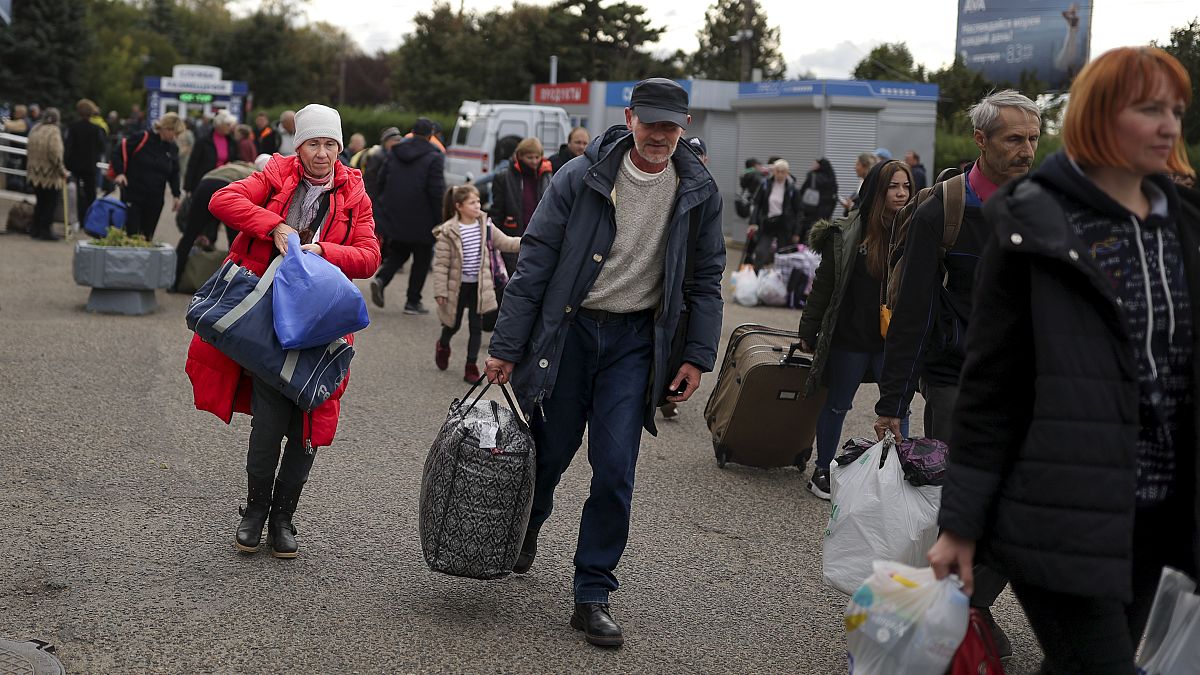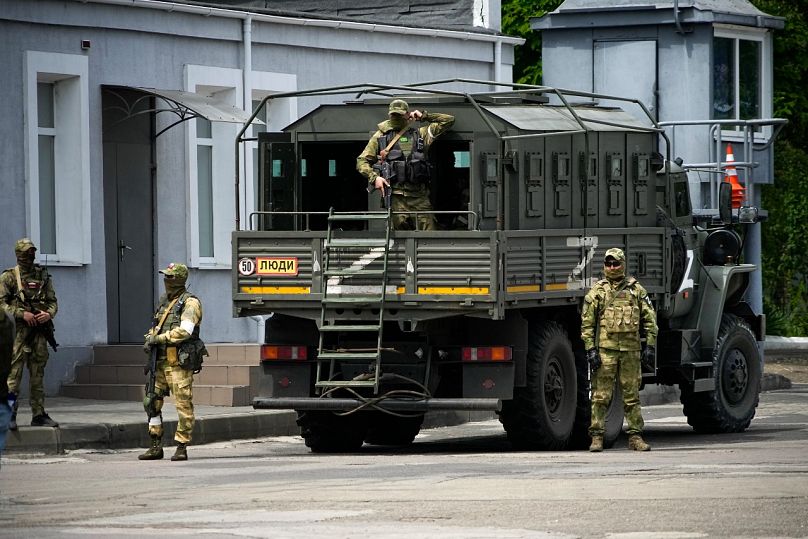Here are the latest developments in Russia's war against Ukraine on Friday.
1. Putin endorses Kherson 'evacuations', Kyiv condemns 'forced displacement'
Vladimir Putin on Friday publicly endorsed the evacuation of civilians from parts of Ukraine's southern Kherson region — his first acknowledgement of a deteriorating situation in a region he claims to have annexed.
"Those who live in Kherson should be removed from the zone of the most dangerous actions, because the civilian population should not suffer," Putin told pro-Kremlin activists as he marked Russia's Day of National Unity.
Moscow has already been ferrying people out of an area it controls in Kherson on the west bank of the Dinpro River, and this week announced that the evacuation zone would also include a 15 kilometre buffer area on the east bank.
Russia's defence ministry said on Friday that more than 5,000 civilians had been leaving their homes every day since evacuations resumed in the Kherson region on Tuesday. Moscow says it has been taking residents to safety from the path of a Ukrainian advance, citing the threat of increased shelling.
Kyiv says the measures have included the "forced mass displacement" of thousands of civilians out of Russian-occupied territory and constitute a war crime, which Moscow denies.
"The Russian occupation administration has begun forced mass displacement of inhabitants" of the Kherson region, the Ukrainian Foreign Ministry said on Friday evening, claiming that "similar displacements are also being carried out by Russia in the Zaporizhzhia, Lugansk and Donetsk regions, as well as in Crimea.
The Russian occupation authorities also assured on Friday that no curfew will be put in place in Kherson, minutes after announcing one.
Signs have been emerging that Russia could be preparing to abandon its military foothold on the west bank of the Dnipro River, including Kherson's regional capital — potentially one of the biggest Russian retreats of the war.
Kyiv's government and its Western allies have remained cautious, suggesting Russia could be setting a trap for advancing Ukrainian troops.
US Defence Secretary Lloyd Austin said on Thursday that Kyiv was "capable" of retaking Kherson.
2. Putin 'waiting for General Winter', says Borrell as G7 pledges help
Vladimir Putin is waiting for "General Winter" to come and support Russia's full-scale invasion of Ukraine, the EU's foreign affairs chief claimed on Friday.
Josep Borrell was speaking as top diplomats from the G7 — which brings together France, Germany, Italy, the UK, Canada, the US, Japan, and the EU — met at Münster in Germany to pledge support to help Kyiv during the forthcoming colder months.
The G7 group agreed to set up a "coordination mechanism" to help Ukraine repair and defend its vital electricity and water supply infrastructure, which has been hit by Russia in recent weeks.
"[Russia] is destroying the country systematically," said Borrell. "Millions of Ukrainians have no longer access to electricity. And what Putin is willing to do is to put the country into darkness in the wintertime, which is a war crime."
Putin was "waiting for General Winter to arrive to support the Russian army," Borrell added. Despite the advances of Ukrainian troops on the northeastern and southeastern fronts, a harsh winter is still expected for soldiers and civilians.
Foreign ministers from the G7 expressed concern over food shortages and the energy crisis as Russia continues its attacks on civilian infrastructure, and said they were committed to helping Ukraine prepare for winter.
"We reiterate our unwavering commitment to continue providing the financial, humanitarian, defense, political, technical, and legal support Ukraine needs to alleviate the suffering of its people and to uphold its sovereignty and territorial integrity within its internationally recognized borders," said the G7 foreign ministers' statement issued on Friday.
"We will not allow the brutality of this war to lead to the mass death of elderly people and children, young people or families in the coming winter months," said Germany's foreign minister Annalena Baerbock.
3. Russia 'trying to terrorize' Ukraine civilians, says G7
The G7 statement condemned Russia's "attacks against civilians and civilian infrastructure, in particular energy and water facilities" using missiles and Iranian drones.
"Russia is trying to terrorize the civilian population. Indiscriminate attacks against civilian population and infrastructure constitute war crimes and we reiterate our determination to ensure full accountability for these and crimes against humanity," the foreign ministers' statement said.
Ukrainian President Volodymyr Zelenskyy accused Russia of "energy terrorism" his Thursday night address, saying the strikes had temporarily left more than 4.5 million people without access to electricity.
Kyiv Mayor Vitali Klitschko said 450,000 apartments in the capital alone were without power on Friday, and appealed to residents to save electricity.
"The very fact that Russia is resorting to energy terrorism shows the weakness of our enemy," Zelenskyy said in his nightly address on Thursday. "They cannot beat Ukraine on the battlefield, so they try to break our people this way."
G7 ministers also said on Friday that any use of chemical, biological, or nuclear weapons by Russia would be met with "severe consequences", and renewed their call on Moscow to end the war in Ukraine.
"Russia's irresponsible nuclear rhetoric is unacceptable," the ministers said in their joint statement.
4. Germany's Scholz urges China's Xi to exert influence on Russia
On his much-criticised visit to China on Friday, German Chancellor Olaf Scholz said he told leader Xi Xinping that “it’s important for China to exert its influence on Russia". He gave no details on what the West wanted China to do.
The Chinese leader repeated a call for talks between Moscow and Ukraine and warned against the conflict going nuclear.
Scholz — accompanied by about a dozen German business leaders — was in Beijing for a one-day visit that has drawn criticism over China’s tacit support for Russia, lingering controversies over economic ties and human rights issues, as well as the timing of the trip.
Beijing has provided Moscow with diplomatic backing by repeatedly calling for peace talks while refusing to support measures at the United Nations criticising Russia's invasion.
It has also accused the US and NATO of provoking the attack and scathingly criticised economic sanctions imposed on Russia.
5. Erdogan and Putin agree to send 'free' grain to Africa
Turkish President Recep Tayyip Erdoğan says Russia had promised to deliver "free" grain to African countries at risk of famine.
Erdoğan said on Friday that he had reached an agreement with his Russian counterpart on the UN-brokered Black Sea export deal.
"Putin told me that we should deliver free grain to these countries, like Djibouti, Somalia, and Sudan — and we agreed," Erdogan said on Friday.
Moscow announced a similar intention on Saturday.
Russia only resumed its participation in the Ukrainian grain deal on Wednesday in an abrupt U-turn after accusing Kyiv of violating the deal by shelling its Black Sea fleet.
Putin has said that Russia would substitute the entire volume of grain destined for the "poorest countries" for free from its own stocks, even if it withdraws from the UN deal again.
The July agreement has allowed around 10 million tonnes of grain and other agricultural products to be exported from Ukraine since August 1.
Grain exports from Ukrainian Black Sea ports resumed on Thursday after Moscow resumed its participation.
German Chancellor Olaf Scholz has called on Moscow to extend the deal, which is due to expire on November 19.
"I call on the Russian president not to refuse the extension of the grain agreement," he said during an official trip to China. "Hunger must not become another weapon."
6. Russia fighting a sacred battle against 'Satan' in Ukraine — Medvedev
Former Russian President Dmitry Medvedev on Friday cast the war in Ukraine as a sacred conflict with Satan, warning that Moscow could send all its enemies to the eternal fires of hell.
Russia has previously tried to portray its aggression as an act of self-defence — Foreign Minister Sergei Lavrov has claimed its war in Ukraine was "not an invasion" — as well as an attempt to weed out "Nazis" from power, and protect persecuted Russian speakers.
Now Medvedev, who was also Russia's prime minister and is now deputy chairman of Russia's Security Council, described his country's mission in overtly religious tones.
In a message marking Russia's Day of National Unity, Medvedev said the task of the fatherland was to "stop the supreme ruler of Hell, whatever name he uses — Satan, Lucifer or Iblis".
Medvedev said Russia had different weapons, including the ability to "send all our enemies to fiery Gehenna", using a Hebrew term often translated as Hell.
Moscow was fighting "crazy Nazi drug addicts" in Ukraine backed by Westerners who he said had "saliva running down their chins from degeneracy", said Medvedev, who once cast himself as a liberal moderniser.
Since the war began, his rhetoric has become increasingly fierce though his published views sometimes chime with thinking at the top levels of the Kremlin elite.
Satan's weapons, Medvedev said, were "intricate lies. And our weapon is the truth. That is why our cause is right. That is why victory will be ours! Happy Holidays!"
Russia's invasion and war in Ukraine — cast by Ukraine and the West as a brutal land grab — has killed tens of thousands, injured many more, and displaced millions.

